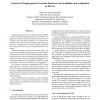Free Online Productivity Tools
i2Speak
i2Symbol
i2OCR
iTex2Img
iWeb2Print
iWeb2Shot
i2Type
iPdf2Split
iPdf2Merge
i2Bopomofo
i2Arabic
i2Style
i2Image
i2PDF
iLatex2Rtf
Sci2ools
AHS
2006
IEEE
2006
IEEE
Gate-level Morphogenetic Evolvable Hardware for Scalability and Adaptation on FPGAs
Traditional approaches to evolvable hardware (EHW), in which the field programmable gate array (FPGA) configuration is directly encoded, have not scaled well with increasing circuit and FPGA complexity. To overcome this there have been moves towards encoding a growth process, known as morphogenesis, however existing approaches have tended to abstract away the underlying FPGA architecture. Although currently commercially available FPGAs are not the most evolution-friendly platforms, having complex architectures and issues with potentially damaging configurations, evolving circuits on commercially available devices without requiring a move to high-level building blocks is a necessary prerequisite for the adoption of EHW to solving real problems in electronic design, repair and adaptation. In this paper we present a morphogenetic EHW model where growth is directed by the gate-level state of the FPGA. We demonstrate that this approach consistently outperforms a traditional EHW approach...
| Added | 10 Jun 2010 |
| Updated | 10 Jun 2010 |
| Type | Conference |
| Year | 2006 |
| Where | AHS |
| Authors | Justin Lee, Joaquin Sitte |
Comments (0)

